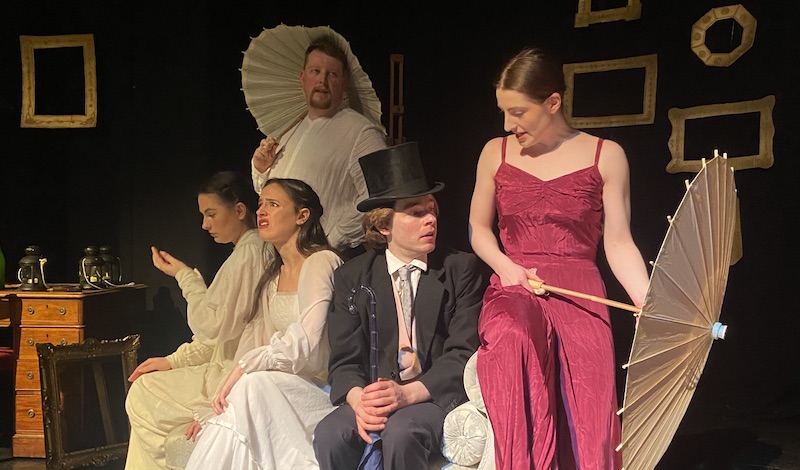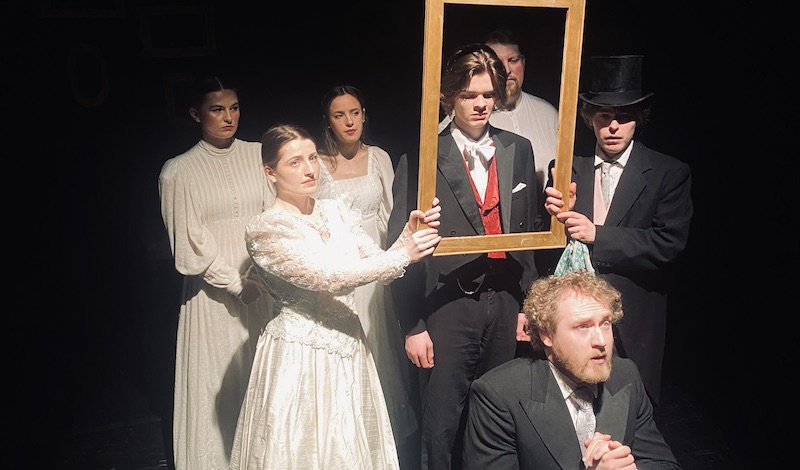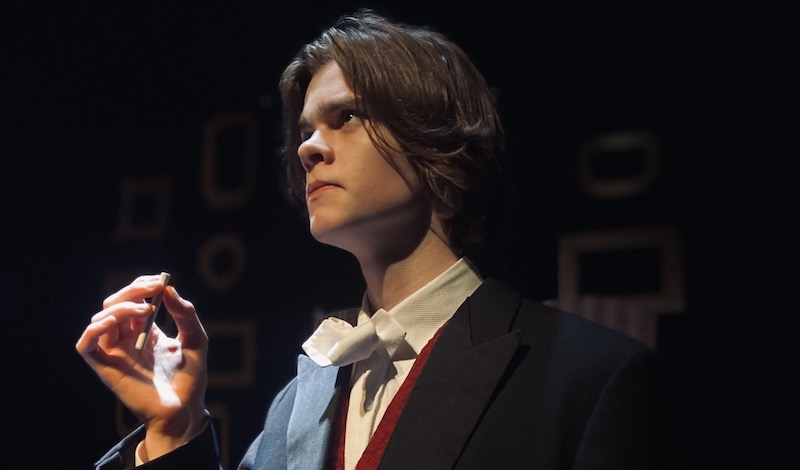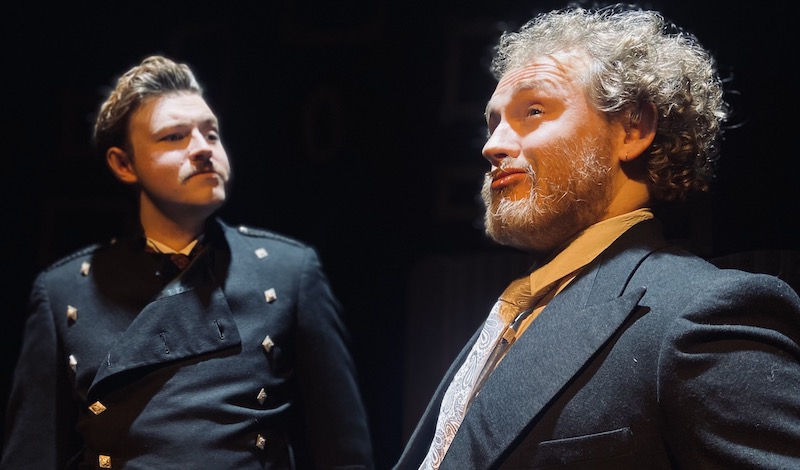The Picture of Dorian Gray
★★★★☆ Shining
Assembly Roxy: Fri 29/Sat 30 March 2024
Review by Thom Dibdin
Young grassroots company Court Jester Theatre give an entertaining take on Oscar Wilde’s novel The Picture of Dorian Gray in a nicely twisting new version which isn’t precious about its vocabulary.
Director and performer Samuel Clarke’s adaptation is loose enough to work splendidly for a contemporary audience, using idioms that were not necessarily available to Wilde, while retaining the core of his shining wit and athletic use of aphorisms.
Clarke fillets the story neatly, focussing tightly on Finnian Smyth’s languorous Dorian Gray and his relationships with Joseph Cathal’s needy painter, Basil Hallward, and Andrew Lodge’s utterly caddish and self-absorbed Lord Henry Wotton.
Smyth is quite the beautiful “beautiful, brainless creature” as Dorian. There is a clear undertone of a homosexual relationship with Hallward, which is nicely played by all concerned. What is hinted at by Cathal’s longing glances, Lodge leaves absolutely no question about.
butterfly
Dorian, butterfly like, flits from one patron to the next. Having sat for his portrait with Hallward, he is easily swayed by Wotton as to his own beauty; how he may use it to make his way though polite society; and falling for his own portrait so completely that he wishes it may grown old as he remains youthful.
Clarke takes the whole piece at quite a lick. It’s good not to get bogged down, but the pace here is just that bit too fast. A slightly more considered pace would give the aphorisms space to breath. This is particularly true for Wotton’s many knowingly risqué pronouncements, although it is a general issue.
One of Clarke’s nice touches is his use of the ensemble in helping the narrative curry along, using them as narrative voices as they dance or mingle around the stage with Dorian at their centre. Sometimes, picking up what ever is lying around to represent a string quartet, at others acting as punters in some iniquitous den or other.
These narrative moments can, too, occasionally become a little lost in their haste, although the meaning is never less than clear, whether it be a society ball, or a low-life opium den.
The five ensemble members put in uniformly strong supporting performances when they take on a variety of invariably well-defined smaller roles. And when a character’s appearance is too brief to make a mark, Clarke’s script ensures their role in the plot is easily understood.
excitement
Talia Rivers’s role as Sibyl Vane, the young working class actress to whom Dorian proposes, is central to the plot, however. There is a real excitement about Sibyl as her feelings teeter over, dulling her performance and causing Dorian to drop her without regret.
And it is when he sees his portrait, with an added line across his forehead after that fateful night, that he realises his picture is not just aging while he stays young, but bearing the burden of his sins.

The ensemble: Holly Walker, Talia Rivers, James O’Neill, Samuel Clarke and Lucy Phillip. Pic Abigail Horne
James O’Neil has great fun in the ensemble, firstly as Sibyl’s vengeful brother, James, but also as a variety of society men – and women – as well as acting turn and turn about with Clarke himself, as a variety of servants to Wotton and Hallward.
Holly Walker is splendid value as Lord Henry’s wife: quite clear as to their different needs and attitudes to life. Lucy Philip adds greatly, keeping things clear in a variety of roles, Lady Monmouth to Clarke’s Lord Monmouth.
worthy adaptation
Haste apart, Clarke’s staging is exceptionally strong. He has his small company dancing in and out of the action, pushing it along and creating clearly differentiated scenes on the one minimal set – comprising a table, an easel, a chaise longe and a screen, with empty picture frames dotted across the backcloth.
Megan Dunlop’s lighting helps in that differentiation, while there is judicious use of sound by Étáin Saoirse Sweeney. The whole being helped along, no doubt, the other member of this small company: production manager and producer Abigail Horne.
A worthy adaptation of Wilde, which draws his ideas down strongly while presenting them in a thoroughly entertaining and quick witted production.
Running time: Two hours (including one interval)
Assembly Roxy, upstairs, 2 Roxburgh Place, EH8 9SU
Fri 29 – Sat 30 March 2024
Evenings: 7.30pm
Tickets and details: Book here.

Joseph Cathal (praying) with Holly Walker, Lucy Philip, Talia Rivers, Finnian Smyth, James O’Neill and Samuel Clarke. Pic: Abigail Horne.
ENDS





















All Clarke’s productions have been equally contemporary adaptations and utterly fresh, cant wait for the next one